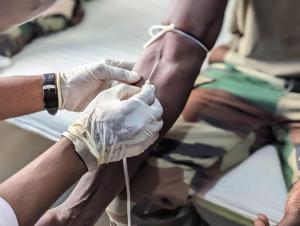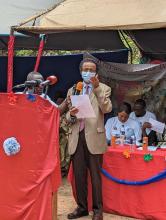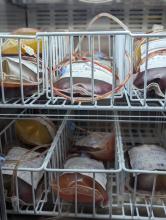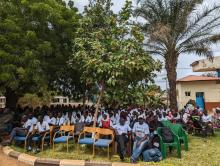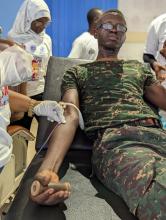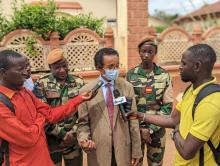WHO and Partners Commemorate World Blood Donor Day Celebrated at Bwiam General Hospital
Bwiam, The Gambia - In a poignant ceremony held at Bwiam General Hospital, the Ministry of Health, in collaboration with the National Blood Transfusion Services, World Bank, and the World Health Organization (WHO), marked World Blood Donor Day. This global event, observed on June 14, underscored the pivotal role of WHO in championing the cause of blood donation and its indispensable role in saving lives. Under the theme "Give blood, give plasma, share life, share often," the campaign served as a tribute to the selfless donors and institutions contributing to blood donation, with a special focus on the critical role played by volunteers who consistently donate and mobilize others to participate.
The ceremony featured a march-past by school children, health officials, and personnel from The Gambia Armed Forces, fostering a collective commitment to the nation's health. Addressing the audience, Dr. Mariatou Jallow, Vice Chair of the Bwiam General Hospital Board, acknowledged WHO's dedication of the day to World Blood Donor Day, emphasizing the life-saving impact of voluntary blood donations facilitated by the organization.
Dr. Desta Tiruneh, WHO Country Representative for The Gambia, took center stage, underscoring the pivotal role of accessible safe blood in delivering quality healthcare services. He paid homage to regular unpaid volunteers, stressing WHO's commitment to the positive impact of blood donation on universal health coverage in The Gambia. Dr. Tiruneh shed light on ongoing collaborations between WHO and the Ministry of Health to review and enhance the blood transfusion chain processes. He highlighted the importance of finalizing the national blood transfusion policy, ensuring modernization and strengthening of blood transfusion services to meet the growing demand. As the demand for blood escalates in The Gambia, Dr. Tiruneh emphasized the need to bridge the gap and strive for self-sufficiency, pointing to the collaborative efforts of the Ministry of Health, WHO, and other partners as a beacon of hope for a healthier and more resilient future for The Gambia.
The World Health Organization continues to play a leading role in shaping the country's blood donation landscape, fostering a culture of regular and voluntary contributions for the well-being of all Gambians. Safe blood is a crucial element in delivering quality health services, particularly in maternal and child health. Recognizing this, the WHO has been working closely with the Ministry of Health (MoH) to review the entire blood transfusion chain processes in The Gambia. The collaborative effort aims to provide advice and assistance to the MoH, addressing organizational and technical issues while improving blood safety and availability across the country.
Currently, blood transfusion services are available in only 18% of healthcare facilities in The Gambia, posing a significant challenge, especially in the context of the country's high maternal mortality rate of 289 deaths per 100,000 live births. Anemia prevalence, affecting up to 60% of the population, contributes to over 50% of anemia-related deaths due to delayed transfusions and the lack of blood availability during emergencies. In this pursuit, the WHO plays a pivotal role, supporting The Gambia in modernizing and strengthening its blood transfusion services.
As the world marks World Blood Donor Day, the collaborative efforts of the Ministry of Health, the National Blood Transfusion Services, and the WHO stand as a testament to the collective commitment to ensuring a healthier and stronger Gambia.



